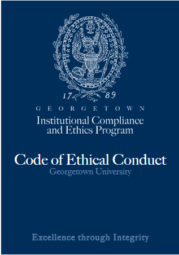Reporting Compliance Concerns
If you see something you don’t think is right or encounter a situation in which you’re not sure what to do, you should raise your concerns or ask questions. Sample compliance concerns might include:
- A situation that feels wrong and makes you uncomfortable.
- Concern that a particular transaction may be inappropriate given what you know about federal or other regulations or University policy.
- Concern about conduct that you believe may violate University policies or otherwise place the University at risk.
- Problems that you have raised with appropriate people, but which have not been corrected.
- Matters about which you don’t know whom to ask.
Asking a question or raising a concern is the right thing to do and benefits you and the University because early identification can help to prevent a small problem from becoming big. Raising such concerns is a service to the University and Georgetown University’s Whistleblower Protection Policy provides that no faculty member, employee or student may be subjected to reprisal or retaliation for making a good faith report or inquiry relating to potential or suspected improper behavior.
In most instances the best place to raise a concern or question is with your supervisor or with another appropriate person in your department, school or unit. There are a number of University offices to which you may bring questions or concerns and which can help in resolving various issues, and the Office of Compliance and Ethics can help direct you to the individuals who are responsible for various enumerated compliance areas that are listed on the Compliance Contacts and Stakeholders page.
The University also provides a confidential and anonymous way to report compliance concerns or problems for which regular channels are uncomfortable or otherwise inappropriate. The Compliance Helpline, which is operated by EthicsPoint, provides both a toll-free telephone reporting line (888-239-9181) and a simple web-based reporting system through which you may make reports or raise questions.
Code of Ethical Conduct


